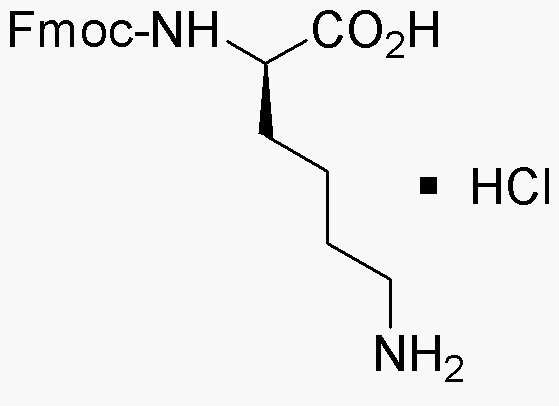Na-Fmoc-D-lysine hydrochloride is widely utilized in research focused on
- Peptide Synthesis: This compound serves as a key building block in solid-phase peptide synthesis, allowing researchers to create complex peptides with specific sequences for various applications in biochemistry and pharmaceuticals.
- Drug Development: Its role in modifying peptide structures makes it valuable in drug design, particularly for developing peptide-based therapeutics that target specific biological pathways.
- Bioconjugation: The Fmoc protecting group enables selective conjugation of peptides to other molecules, which is essential in creating targeted drug delivery systems and diagnostic agents.
- Research in Neuroscience: This compound is used in studies involving neuropeptides, helping scientists understand their role in neural signaling and potential therapeutic targets for neurological disorders.
- Protein Engineering: It aids in the design of modified proteins with enhanced properties, which can be crucial for applications in biotechnology and synthetic biology.
Informations générales
Propriétés
Sécurité et réglementation
Applications
Na-Fmoc-D-lysine hydrochloride is widely utilized in research focused on
- Peptide Synthesis: This compound serves as a key building block in solid-phase peptide synthesis, allowing researchers to create complex peptides with specific sequences for various applications in biochemistry and pharmaceuticals.
- Drug Development: Its role in modifying peptide structures makes it valuable in drug design, particularly for developing peptide-based therapeutics that target specific biological pathways.
- Bioconjugation: The Fmoc protecting group enables selective conjugation of peptides to other molecules, which is essential in creating targeted drug delivery systems and diagnostic agents.
- Research in Neuroscience: This compound is used in studies involving neuropeptides, helping scientists understand their role in neural signaling and potential therapeutic targets for neurological disorders.
- Protein Engineering: It aids in the design of modified proteins with enhanced properties, which can be crucial for applications in biotechnology and synthetic biology.
Documents
Fiches de données de sécurité (FDS)
La FDS fournit des informations de sécurité complètes sur la manipulation, le stockage et l’élimination du produit.
Spécifications du produit (PS)
Le PS fournit une description complète des propriétés du produit, notamment sa composition chimique, son état physique, sa pureté et les exigences de stockage. Il détaille également les plages de qualité acceptables et les applications prévues du produit.
Certificats d'analyse (COA)
Recherchez des certificats d'analyse (COA) en saisissant le numéro de lot du produit. Les numéros de lot et de lot se trouvent sur l'étiquette d'un produit, après les mots « Lot » ou « Lot de fabrication ».
Numéro de catalogue
Numéro de lot/série
Certificats d'origine (COO)
Ce certificat d'exploitation confirme le pays dans lequel le produit a été fabriqué, et détaille également les matériaux et composants utilisés et s'il est issu de sources naturelles, synthétiques ou autres sources spécifiques. Ce certificat peut être requis pour les douanes, le commerce et la conformité réglementaire.
Numéro de catalogue
Numéro de lot/série
Fiches de données de sécurité (FDS)
La FDS fournit des informations de sécurité complètes sur la manipulation, le stockage et l’élimination du produit.
DownloadSpécifications du produit (PS)
Le PS fournit une description complète des propriétés du produit, notamment sa composition chimique, son état physique, sa pureté et les exigences de stockage. Il détaille également les plages de qualité acceptables et les applications prévues du produit.
DownloadCertificats d'analyse (COA)
Recherchez des certificats d'analyse (COA) en saisissant le numéro de lot du produit. Les numéros de lot et de lot se trouvent sur l'étiquette d'un produit, après les mots « Lot » ou « Lot de fabrication ».
Numéro de catalogue
Numéro de lot/série
Certificats d'origine (COO)
Ce certificat d'exploitation confirme le pays dans lequel le produit a été fabriqué, et détaille également les matériaux et composants utilisés et s'il est issu de sources naturelles, synthétiques ou autres sources spécifiques. Ce certificat peut être requis pour les douanes, le commerce et la conformité réglementaire.


